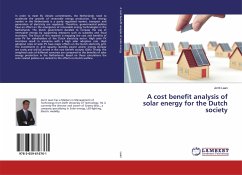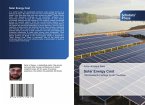In order to meet EU climate commitments, the Netherlands need to accelerate the growth of renewable energy production. The energy market in the Netherlands is a partly regulated market, transport and generation of electricity are regulated. Therefore, governmental policies have an effect on the emergence of renewable energy technologies in the Netherlands. The Dutch government decided to increase the use of renewable energy by supporting measures such as subsidies and fiscal incentives. The focus of this research is mapping the cost and benefits of solar PV for stakeholders of the Dutch electricity sector. High solar PV incentives result in scenarios with a high solar adoption rate. High adoption rates of solar PV have major effects on the Dutch electricity grid. The investments in: grid capacity, standby power and/or energy storage are costly and will be priced in the cost benefit analysis (CBA). Finally, the weighted costs of different scenarios are compared to the benefits of solar energy production in the Netherlands. Based on those calculations the solar related policies are ranked to the effects on Dutch welfare.
Bitte wählen Sie Ihr Anliegen aus.
Rechnungen
Retourenschein anfordern
Bestellstatus
Storno








